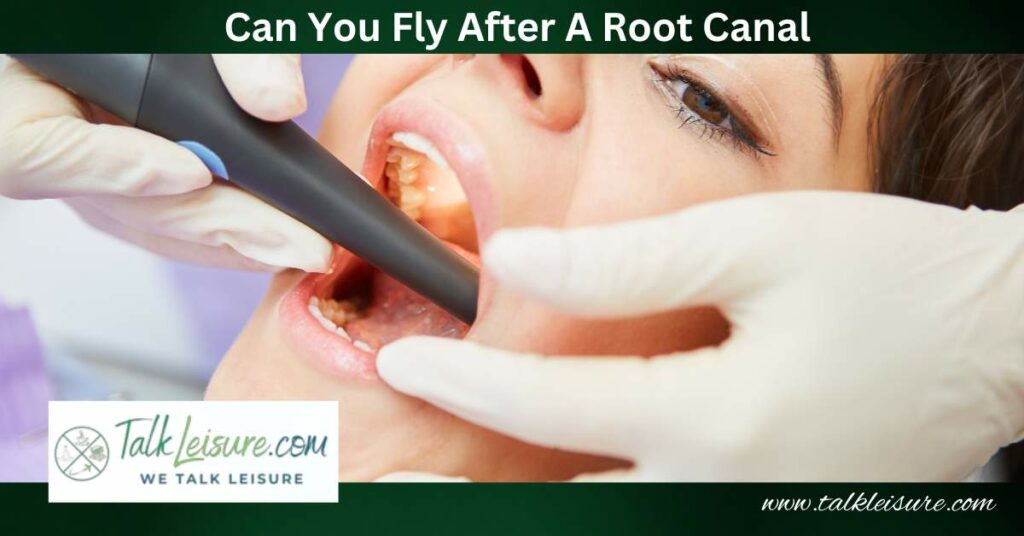Are you wondering if taking a flight after a root canal is safe?
Well, you’re not alone. Traveling after dental work can sometimes be tricky and concerning.
The good news is that with the right care and precautions, you can continue with your travel plans after a root canal.
In this article, we’ll explore the facts and tips on whether or not you can fly after a root canal and what to expect during your journey.
So, let’s dive in and ease your worries!
If you plan to travel by air soon after a root canal procedure, you might wonder if it is safe to fly.
Changes in altitude during air travel can cause discomfort and pressure in your body, including your teeth and gums.
However, proper preparations allow you to fly after a root canal without issues.
According to experts, flying after a root canal surgery is generally safe, but you need to take some precautions to avoid any complications.
Before taking a flight, you should wait 5 to 7 days after the procedure.
Additionally, you must stay hydrated during the flight by drinking enough water and taking any necessary medicines recommended by your dentist or endodontist.
What Is A Root Canal?
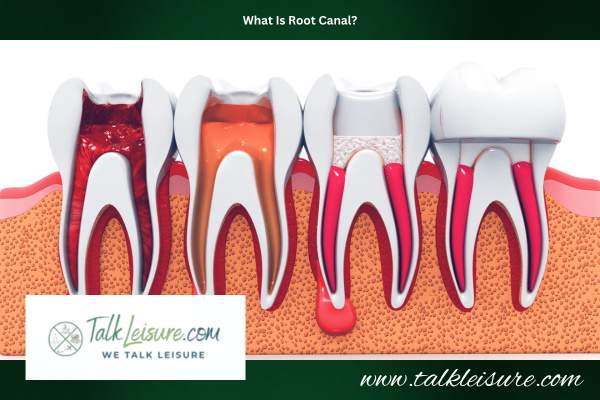
It involves the removal of the infected or inflamed pulp inside the tooth, then cleaning and sealing the tooth to prevent further infection.
This procedure is usually recommended when there is deep decay, a crack or chip in the tooth, or trauma to the tooth.
The American Association of Endodontists recommends root canal therapy when patients experience symptoms such as severe toothache, sensitivity to hot and cold, or swelling and tenderness in the gums.
Despite its reputation for being painful, most patients experience little to no pain during the procedure thanks to modern anesthetics.
Trust the endodontists to ensure your root canal experience is smooth and pain-free.
Can You Fly After A Root Canal?
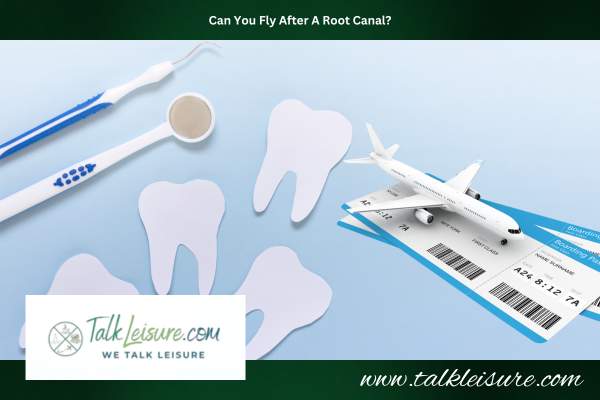
After a root canal procedure, many people wonder if it is safe to fly.
While it is generally safe to travel after a root canal, there are some precautions to remember.
Your endodontist will likely recommend waiting 5-7 days before flying to ensure no post-operative issues.
Changes in air pressure during flights can cause discomfort or sensitivity, so it’s important to be prepared.
Unlike to root canal, for weight loss treatments like gastric bypass surgery you may need to wait around six to eight weeks before flying.
One of the best ways to ease discomfort is to take over-the-counter pain relievers before your flight.
Also, be cautious about what you eat during the flight and avoid hard or crunchy foods that could irritate the treated tooth.
Maintaining excellent oral hygiene while traveling and brushing and flossing twice daily with non-abrasive products is vital.
Feel free to enjoy your trip, and make sure your treated tooth is cared for as best as possible.
Following these travel tips can help make your trip comfortable and safe.
What Are The Potential Concerns Regarding Air Travel After A Root Canal?
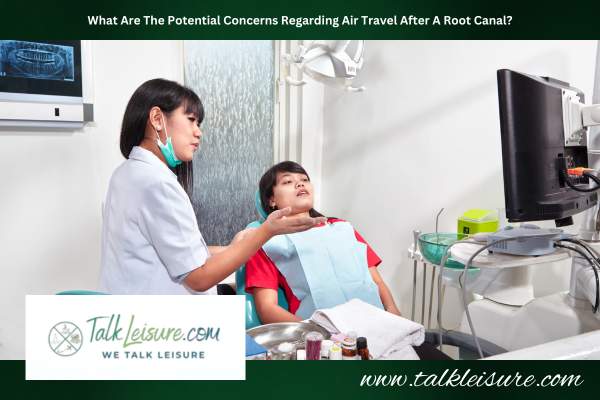
Air travel after a root canal can be a concern for many patients due to the potential discomfort caused by changes in air pressure during the flight.
According to experts, it is safe to travel after a root canal, but patients should keep some potential concerns in mind.
With proper care and attention to oral hygiene, air travel after a root canal procedure should not cause any significant concerns.
The Common Fear Of Air Pressure Changes Affecting Dental Work
Many worry about how air pressure changes during flights can affect dental work, specifically root canals.
However, recent dental work like root canals generally poses little risk.
Medications, certain surgical cases, active lesions, abscesses, and potential unfinished dental work may pose issues.
A toothache from flying is known as Barodontalgia, which is usually a risk for those with poor oral health.
In most cases, flying after a root canal is safe, but waiting 5-7 days is recommended to ensure there are no post-op pain or issues.
If the temporary filling is dislodged, seeing a dentist before flying again is best, as gas may expand within the tooth.
Suppose you have been through hip replacement, then it best to avoid short flight for 7 to 10 days.
The Impact Of Air Pressure Changes On The Teeth And Gums
Air pressure changes during flights can greatly impact your teeth and gums.
The atmospheric pressure on a plane can cause a toothache and discomfort in your ears, nose, and mouth.
Barodontalgia, or tooth squeeze, occurs due to changes in barometric pressure during flights.
These changes can cause an underlying cavity or previous filling to act up and result in severe pain.
Therefore, scheduling a dental exam and, if necessary, completing any required dental procedures before boarding a flight is essential.
Furthermore, long-duration flights can decrease the retention of partial and full dentures, especially when the mouth becomes dry.
Overall, seeing a dentist before flying is highly recommended to ensure a comfortable and pain-free journey.
What Are The Tips For A Safe Flight After A Root Canal?
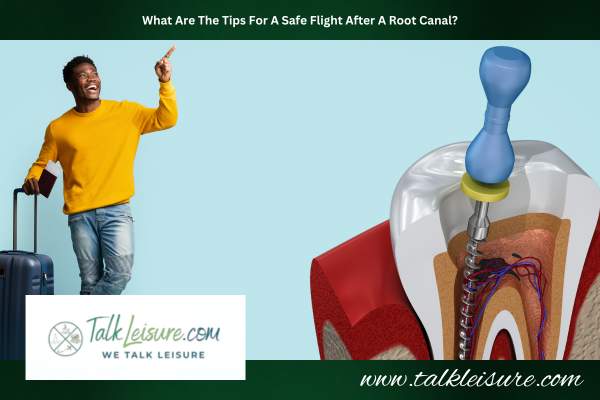
Traveling after getting a root canal is possible, but certain precautions must be taken.
Here are some tips to ensure a safe and pain-free flight after your dental procedure:
Be Prepared For Altitude Changes
Altitude changes can result in discomfort and sinus pain, especially after a root canal procedure.
It is essential to be prepared for this if you plan to travel after your treatment.
Sensitivity to changes in altitude can occur for a few days following the procedure, making air travel uncomfortable.
Over-the-counter pain relievers, such as ibuprofen, can help to alleviate discomfort.
It is best to schedule your root canal at least one month before your planned trip to avoid any discomfort during travel.
Be Cautious About Food Intake During The Flight
While flying after a root canal is generally safe, certain precautions must be taken, especially when consuming food and beverages.
It is recommended to avoid hot, cold or hard foods that may aggravate the area where dental work has been done.
Additionally, it is best to avoid alcohol and carbonated beverages, as they can cause dryness in the mouth, which may lead to discomfort.
To avoid discomfort during the flight, it is best to plan and pack snacks to stay comfortable throughout the journey.
Keep Yourself Hydrated
Staying hydrated is important for overall health, but it becomes even more crucial after dental procedures, including root canals.
Boyles General Dentistry says, “It’s important to keep your mouth moist when traveling. This will prevent additional bacteria from infecting your tooth.”
Drinking water is the easiest and most effective way to stay hydrated and maintain good oral hygiene.
It’s also important to avoid sugary or acidic drinks such as soda, sports drinks, and lemonade, as they can cause tooth decay and sensitivity.
Instead, opt for water or other sugar-free drinks to keep yourself hydrated without harming your teeth.
If you are traveling to an area with contaminated drinking water, pack bottled water for drinking and brushing.
It’s recommended that you continue to drink plenty of water throughout your flight to prevent dehydration and minimize discomfort from changes in altitude.
Take Necessary Medicines
After a root canal, taking the necessary medicines to ensure you don’t experience any pain or discomfort is important.
Your endodontist will likely prescribe antibiotics and pain relievers to help heal and alleviate any pain.
It’s important to take these medications as directed and not skip any doses.
If you’re traveling, pack all necessary medicines in your carry-on bag.
In addition to prescribed medications, over-the-counter pain relievers can help manage discomfort during and after your flight.
Herbal capsules like kratom is also an excellent pain relief medication.
It is important to check with you doctor before taking such pills as they may trigger side effects.
Also, it is important to check the legal status when taking kratom on plane.
As always, check with your doctor or endodontist before taking additional medications.
Pack Your Oral Hygiene Essentials
Traveling after a root canal can be tricky, as you need to ensure that your dental work doesn’t get affected while you’re away from home.
To ensure your vacation or trip goes smoothly, you should pack a few essential oral hygiene items. Here are some tips:
Check whether you’ve packed your oral hygiene essentials, including your toothbrush, toothpaste, and floss.
By following these tips, you can ensure that your dental work stays healthy and that you have a pleasant trip without complications.
What Are The Risks Of Flying After A Root Canal?
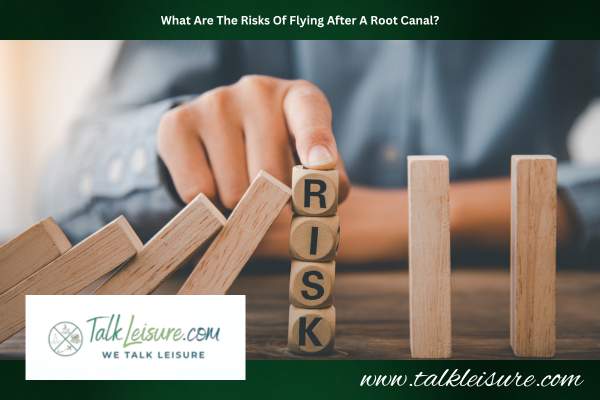
Traveling after a root canal may seem worrisome for many individuals.
While it is possible to travel after getting a root canal, there are certain risks that you need to be aware of.
As they say, prevention is better than cure, so taking care of your dental health before you travel is always advisable.
Tooth Pain
Tooth pain can be a real problem when traveling, especially if you’ve recently had dental work done, like a root canal or extraction.
Changes in altitude can worsen symptoms like sinus pain, headaches, and tooth pain.
However, the severity of these symptoms can vary depending on your tooth sensitivity, the proximity of the dental work to the nerve, and your pain tolerance.
Generally, it’s safe to fly after dental work, but waiting at least 5 to 7 days after a root canal and 48 hours after an extraction is recommended.
Flying may also increase the risk of developing blood clots. Therefore, it is important to be aware of the preventive measures.
Dental Restorations Or Repairs
When it comes to dental restorations or repairs, it’s important to consider the impact of travel on your teeth.
Whether you’ve had a root canal or other dental procedure, protecting your teeth and maintaining good oral hygiene while on the go is crucial.
Schedule any necessary dental procedures well before your travel plans to allow ample time for healing and recovery.
Consult with your dentist or endodontist before flying, especially if you’ve had recent dental work or suffer from tooth pain or sensitivity.
Avoid hard or chewy foods that can damage or dislodge dental restorations, and opt for soft, easy-to-chew options while traveling.
Traveling can be a fun and exciting adventure, but taking care of your teeth along the way is important.
Bad Breath
Traveling is one of life’s greatest pleasures, but it can risk your dental health.
Bad breath is a common issue many people face when flying due to changes in altitude and reduced saliva production.
Snacking accordingly and drinking plenty of water can help combat bad breath.
Avoiding fast food and choosing sugar-free gum to keep your breath fresh during a flight is best.
According to Smiles at San Tan Ranch, “there is reduced saliva production due to increased elevation, forcing plaque formation and bad breath.” So, it’s important to stay
Final Thoughts
Traveling after a root canal is possible, but there are some important factors to keep in mind to ensure a smooth and successful trip.
It’s important to plan, as the effects of sedation can take some time to wear off, and changes in altitude can cause discomfort for a few days after the procedure.
It’s also important to take care of your teeth while you’re away from home, using a soft-bristled toothbrush and non-abrasive toothpaste and not biting down too hard on the treated tooth.
Drinking water and avoiding foods that may dislodge or irritate the area are also important.
If you experience any discomfort or pain, make sure to have over-the-counter pain relievers on hand.
And always remember to keep your endodontist’s phone number with you in emergencies.
Taking the necessary precautions to ensure a successful trip will help protect your investment in your dental health and allow you to enjoy your travels with peace of mind.
FAQs
Can You Fly After A Recent Tooth Filling?
After getting a tooth filled, many people wonder if it’s safe to fly.
The good news is that, in most cases, flying after a recent dental filling generally poses little risk.
However, waiting 5-7 days after the root canal is recommended to ensure no post-operation pain or issues before flying.
Should I Take Dentures Off On An Air Plane?
When wearing dentures on an airplane, many people wonder if they should remove them before takeoff.
While there’s no hard-and-fast rule on this, some denture wearers may experience discomfort due to changes in air pressure during flights.
In addition, there’s also a concern that if dentures become dislodged during the flight, it could pose a choking hazard.
However, deciding to remove dentures is ultimately up to the individual and their dental practitioner.
In summary, while it is generally safe to wear dentures on an airplane, there are some potential discomfort and safety concerns to be aware of.
Can I Drink Coffee After A Root Canal?
After a root canal procedure, one of the most common questions people ask is whether they can drink coffee.
While returning to your regular cup of coffee is tempting, it is essential to be cautious and listen to your dentist’s instructions.
The heat from the coffee hinders gum tissue regeneration and reduces the chances of a successful root canal.
However, you can have iced or lukewarm coffee, which does not pose the risk of burns.

